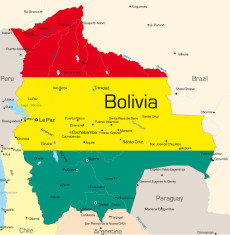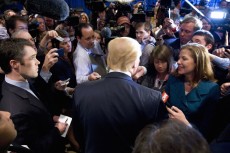Robert Higgs • Tuesday, March 8, 2016 •
 Some people say that the USA is going to the dogs (no offense intended, perros), and it’s child’s play to demonstrate many ways in which this claim is true—growing police brutality, burgeoning government debt, ever more numerous and onerous regulations, destructive monetary and credit-allocation policies, boiling ethnic and religious animosity, endless foreign wars, to mention but a few issues among many. But there’s a problem: the country has always been going to the dogs. Yes, in certain regards life in the USA used to be freer; but in other regards it used to be less free. Yes, the government’s policies are horrendous and destructive; but in many ways the government’s policies were always horrendous and destructive.
Some people say that the USA is going to the dogs (no offense intended, perros), and it’s child’s play to demonstrate many ways in which this claim is true—growing police brutality, burgeoning government debt, ever more numerous and onerous regulations, destructive monetary and credit-allocation policies, boiling ethnic and religious animosity, endless foreign wars, to mention but a few issues among many. But there’s a problem: the country has always been going to the dogs. Yes, in certain regards life in the USA used to be freer; but in other regards it used to be less free. Yes, the government’s policies are horrendous and destructive; but in many ways the government’s policies were always horrendous and destructive.
No decent person likes the building of a fortified wall to keep peaceful migrants from entering the Land of the Free freely, but at least we are not marching members of the Five Civilized Tribes hundreds of miles at gunpoint in the dead of winter to live and die in a remote wilderness. No decent person likes the way blacks are victimized by the drug war, the crooked cops and prosecutors, and the prison-industrial complex, but at least we no longer have chattel slavery where human beings are bought and sold like livestock at private auction. No decent person likes the demonization of Muslims, but at least we haven’t forced all of them into prison camps, as the West-coast people of Japanese ancestry were forced in 1942-45. And so forth.
The country has always been rotten, full of coercive busybodies eager to use state power to punish their neighbors whose conduct, creed, or ethnicity did not please them. The country has always been teeming with hotheads eager to go to war with practically anyone who seemed to them suitable for killing. The country has always been ruled by crooked politicians and scheming, would-be crony capitalists. Rotten, rotten, rotten to the core from the get-go.
John R. Graham • Tuesday, March 8, 2016 •
 A remarkable study published in the BMJ concludes that $1.8 billion of the $18 billion spent on the 20 most expensive cancer drugs in the United States is wasted due to cunning marketing by drug-makers. Chemotherapeutic doses are often adjusted by body weight. However, the drugs are shipped in vials containing doses appropriate to bigger people. Once opened, the drug that remains after an oncologist selects the dose appropriate for a smaller or average-sized person has to be discarded.
A remarkable study published in the BMJ concludes that $1.8 billion of the $18 billion spent on the 20 most expensive cancer drugs in the United States is wasted due to cunning marketing by drug-makers. Chemotherapeutic doses are often adjusted by body weight. However, the drugs are shipped in vials containing doses appropriate to bigger people. Once opened, the drug that remains after an oncologist selects the dose appropriate for a smaller or average-sized person has to be discarded.
The authors allege the drug-makers do this deliberately, to increase profits. Their proposed solution is that the Food and Drug Administration should regulate the size of vials! There is a better way.
First, the FDA is not concerned with the cost of medicines. The proposed solution has nothing to do with safety or efficacy, so is not within the FDA’s purview.
Lawrence J. McQuillan • Friday, March 4, 2016 •
Bernie Sanders is proud to be a socialist. In July 2015, he told The Nation: “Do they think I’m afraid of the word? I’m not afraid of the word.” As far back as 1989, Sanders said: “I think there has been too much of a reluctance on the part of progressives and radicals to use the word socialism.” Sanders chooses to emphasize selective aspects he considers “positive,” while ignoring socialism’s brutal history.
In the 1960s, Sanders joined the Young People’s Socialist League, the youth wing of the Socialist Party USA. To Sanders, socialism means using government power to forcibly redistribute income and wealth from one group of people to another, which he thinks can be a good thing:
I think it means the government has got to play a very important role in making sure that as a right of citizenship, all of our people have healthcare; that as a right, all of our kids, regardless of income, have quality childcare, are able to go to college without going deeply into debt . . .
But as the old adage warns: a government powerful enough to give you everything you want is powerful enough to take away everything you have. That includes life itself. Sanders does not give his millennial followers, likely unaware of socialism’s record, a full picture of where concentrated government power inevitably leads.
Samuel R. Staley • Thursday, March 3, 2016 •
 My blogging colleague Bob Murphy did a nice job of reviewing The Big Short in January, but the film is worth revisiting in light of its Academy Award win for best adapted screenplay. Nominated for five awards, including Best Picture and Best Director, with fine acting by all the principals in the star-studded cast, the fact it won on the strength of the story may bode well for capitalism in Hollywood.
My blogging colleague Bob Murphy did a nice job of reviewing The Big Short in January, but the film is worth revisiting in light of its Academy Award win for best adapted screenplay. Nominated for five awards, including Best Picture and Best Director, with fine acting by all the principals in the star-studded cast, the fact it won on the strength of the story may bode well for capitalism in Hollywood.
The Big Short chronicles the financial meltdown that triggered the so-called Great Recession in the wake of the bursting housing bubble, and is based on the 2010 book by Michael Lewis. The film follows the conventional narrative, taking aim at Wall Street bankers while ignoring the bigger policy issues such as relaxed lending rules and federal policies that pushed mortgage lending into dangerous territory that set up the bubble. (See the chapters in Housing America on Fannie Mae, Freddie Mac and the mortgage meltdown by Lawrence J. White and Stan J. Liebowitz for this deeper analysis.) But Bob points out that the film focuses on a small group of heroes: savvy financial investors and hedge-fund managers who identify the bubble and unveil the corruption (moral and institutional) that leads to the economy’s collapse. These prescient financial geeks are given a surprisingly good turn because unlike many (most?) other films these capitalists have dimension. They aren’t rapacious “greed is good” businessmen. They have a heart, and a soul, and this moral core is critical to the plot and the tension that keeps viewers engaged (as well as extraordinary editing).
Abigail R. Hall • Thursday, March 3, 2016 •
 The Healthy, Hunger-Free Kids Act was championed by First Lady Michelle Obama and signed into law in 2012. A press release for the program issued at its launch claimed that the “new standards will improve the health and well being of 32 million kids.” Unfortunately for the children of America, the lunch line may be their first experience with government paternalism and a rough introduction to some fundamental economics.
The Healthy, Hunger-Free Kids Act was championed by First Lady Michelle Obama and signed into law in 2012. A press release for the program issued at its launch claimed that the “new standards will improve the health and well being of 32 million kids.” Unfortunately for the children of America, the lunch line may be their first experience with government paternalism and a rough introduction to some fundamental economics.
The rules surrounding school lunches were “built around the recommendations from a panel of experts” and aimed to encourage some eating behaviors while discouraging others. The Act has become a textbook case of unintended consequences.
Instances of waste under the program have increased dramatically. Shockingly, as anyone with children, siblings, or just a little common sense can tell you, telling kids to eat their vegetables doesn’t actually make it happen. As opposed to pushing children toward healthier eating options, the new rules simply prompt kids to throw more food away. One report from the University of Vermont found that the amount of food thrown away since the new rules were implemented increased by a whopping 56 percent.
Alvaro Vargas Llosa • Tuesday, March 1, 2016 •
 These are not happy days for Latin America’s authoritarian populists. The defeat of Evo Morales, the President of Bolivia, in a recent referendum designed to allow him to seek a fourth consecutive term comes only weeks after Venezuela’s opposition wrested control of the National Assembly following a massive election victory and a few months after the Peronistas were kicked out of office in Argentina.
These are not happy days for Latin America’s authoritarian populists. The defeat of Evo Morales, the President of Bolivia, in a recent referendum designed to allow him to seek a fourth consecutive term comes only weeks after Venezuela’s opposition wrested control of the National Assembly following a massive election victory and a few months after the Peronistas were kicked out of office in Argentina.
Morales, who became an international poster child of the indigenous revolt against the white elites, is a perfect example of the new, more subtle type of authoritarian ruler that has plagued Latin America in the last decade or so. After toppling several governments by means of violent street action, he won a solid mandate and quickly used it to dismantle the republican institutions that had been so useful to him in his ascent to power. He changed the name of the country and replaced the old institutions with a new constitution whose real purpose was to make it possible for him to run for a second term. He did and won.
Then he ran for a third term, thanks to a docile judiciary that decided his second term had really been his first term because the previous one had taken place under a different republic. Since the new constitutions authorized two consecutive terms, he got a green light and won again. Then he decided he wanted a fourth term. This time the legislature passed a law that needed to be ratified in a national referendum that was supposed to make it possible for him to run again in 2019—and govern until 2025.
John R. Graham • Monday, February 29, 2016 •
 The Government Accountability Office has just released a report detailing the massive opportunities for fraudulently getting tax credits in Obamacare’s health insurance exchanges. Obamacare sends billions of taxpayers’ dollars to health insurers that operate in these exchanges—$37 billion last year alone. These tax credits are used to discount premiums for plans offered in the exchanges. Here is an excerpt from the report highlights:
The Government Accountability Office has just released a report detailing the massive opportunities for fraudulently getting tax credits in Obamacare’s health insurance exchanges. Obamacare sends billions of taxpayers’ dollars to health insurers that operate in these exchanges—$37 billion last year alone. These tax credits are used to discount premiums for plans offered in the exchanges. Here is an excerpt from the report highlights:
During undercover testing, the federal Marketplace approved subsidized coverage under the act for 11 of 12 fictitious GAO phone or online applicants for 2014. The GAO applicants obtained a total of about $30,000 in annual advance premium tax credits, plus eligibility for lower costs at time of service. The fictitious enrollees maintained subsidized coverage throughout 2014, even though GAO sent fictitious documents, or no documents, to resolve application inconsistencies.
Eleven out of 12: a failure rate of 92 percent. And these were government employees acting as stooges, not hardened fraudsters. I am sure GAO was shocked that so many not only got approved, but continued to receive subsidies through the year.
Robert Higgs • Sunday, February 28, 2016 •
 A while back one could have heard the masses chanting lustily, “Peron, Peron, Peron!” Today the masses can be heard chanting with equal fervor, “Trump, Trump, Trump!” And their gut feelings would seem to be much the same. Their dyspepsia springs, they suppose, from the evil machinations of the oligarchs whose actions have denied them the secure, well-paid jobs and the social respect to which they imagine themselves justly entitled—although prolonged meditation on moral philosophy cannot be said to occupy them much.
A while back one could have heard the masses chanting lustily, “Peron, Peron, Peron!” Today the masses can be heard chanting with equal fervor, “Trump, Trump, Trump!” And their gut feelings would seem to be much the same. Their dyspepsia springs, they suppose, from the evil machinations of the oligarchs whose actions have denied them the secure, well-paid jobs and the social respect to which they imagine themselves justly entitled—although prolonged meditation on moral philosophy cannot be said to occupy them much.
But in today’s USA they don’t need to take a college course in moral philosophy to know that the ruling classes, the mainstream media, the Hollywood producers, the educational elites, and all the rest of their self-appointed betters look down on them with the same contempt that the Argentine oligarchs once felt for the descamisados of that long-past time in another, once-prosperous land. Thus, the same politics of class resentment that brought golden Argentina to its near-Third World knees now bids fair to bring America’s own Peron to the throne sans Evita with a barge-load of economically destructive policies and attitudes in tow—especially the xenophobia, the protectionism, and the inward-looking, closed-borders mentality—that must have old Juan cackling with laughter in his grave. Demagogues are born, and demagogues die, but economically and socially destructive nonsense retains its force and appeal to the masses indefinitely. Not even widespread affluence can dispel economic ignorance and social resentment.
With policies of fascist nationalism and a posture of “strong leadership,” Mussolini led Italy to ruin. With policies of fascist nationalism and a posture of “strong leadership,” Peron led Argentina to ruin. With similar policies and posture, will Trump complete the trifecta in the USA?
(N.B. In writing the foregoing, I am in no way endorsing any other candidate for the presidency. All of the leading contenders offer similar species of economic fascism and pose as strong leaders. However, they possess different bases of solid supporters, and, for example, the supporters of Clinton, Sanders, and Trump, despite some overlap in policy preferences, thoroughly despise one another in many cases. Thus does identity’s relation to ideology color and direct political preferences in this instance, as it usually does in any political contest.)
Samuel R. Staley • Saturday, February 27, 2016 •
 Jennifer Lawrence is up for Best Actress Oscar for her performance in Joy, a film loosely based on the entrepreneurial rise of inventor Joy Mangano. Lawrence may have a shot at the award after her Golden Globe win for Best Actress, and this would strike an important popular culture blow in favor of entrepreneurship. While not the strongest film of 2015, Joy is entertaining and one of the few mainstream releases that depicts the many gritty realities faced by real entrepreneurs in a positive and inspiring light.
Jennifer Lawrence is up for Best Actress Oscar for her performance in Joy, a film loosely based on the entrepreneurial rise of inventor Joy Mangano. Lawrence may have a shot at the award after her Golden Globe win for Best Actress, and this would strike an important popular culture blow in favor of entrepreneurship. While not the strongest film of 2015, Joy is entertaining and one of the few mainstream releases that depicts the many gritty realities faced by real entrepreneurs in a positive and inspiring light.
As the real Joy Mangano says, as an entrepreneur “you have to be brave.” David O’Russell’s choice as director to focus on the human side of entrepreneurship, and his decision as a screenwriter to give entrepreneurial effort dimension through the characters played by Lawrence and Bradley Cooper, leads to a film that is more holistic and nuanced than most stories cast for the silver screen.
Mangano is the inventor of the Miracle Mop, a revolutionary redesign of the conventional mop that made the serial inventor millions of dollars. The film follows Mangano’s rise to wealth based on that invention. Lawrence’s performance is quite strong, and she really seems to understand the bootstrapping spirit of Mangano.
Lawrence J. McQuillan • Friday, February 26, 2016 •
 Spring is around the corner, which means the 2016 Major League Baseball season starts soon. Baseball has long been an international game, but more so today than ever.
Spring is around the corner, which means the 2016 Major League Baseball season starts soon. Baseball has long been an international game, but more so today than ever.
On opening day last year, 230 players on the 25-man rosters and inactive lists were born outside the 50 U.S. states, or 27 percent of the players. They represented 17 countries and territories outside the U.S.
The Dominican Republic led with 83 foreign-born players. Venezuela was second with 65 players including two-time MVP Miguel Cabrera of the Detroit Tigers, All-Star Jose Altuve of the Houston Astros, and 2012 World Series MVP Pablo Sandoval, then with the San Francisco Giants. But Venezuela’s prominence could soon end.
Baseball was introduced to Venezuela by U.S. oil workers in the early 20th century. MLB teams once had 23 baseball academies in Venezuela to develop top prospects. But due to devastating economic problems created by the socialist government in Venezuela, only four academies remain. Venezuela has less economic freedom than any country in the world. Widespread crime, chronic food shortages, and hyperinflation have prompted teams to close their academies and exit the country.
The departure of baseball academies has hurt local economies and reduced entertainment options for residents – baseball is the national pastime in Venezuela. Closing the academies has also made it more difficult for young prospects to pursue their dreams — the greatest loss of all.
Below is an excellent story by National Public Radio on the plight of baseball in Venezuela that’s worth listening to for anyone who is a fan of baseball and supporter of liberty.
 Some people say that the USA is going to the dogs (no offense intended, perros), and it’s child’s play to demonstrate many ways in which this claim is true—growing police brutality, burgeoning government debt, ever more numerous and onerous regulations, destructive monetary and credit-allocation policies, boiling ethnic and religious animosity, endless foreign wars, to mention but a few issues among many. But there’s a problem: the country has always been going to the dogs. Yes, in certain regards life in the USA used to be freer; but in other regards it used to be less free. Yes, the government’s policies are horrendous and destructive; but in many ways the government’s policies were always horrendous and destructive.
Some people say that the USA is going to the dogs (no offense intended, perros), and it’s child’s play to demonstrate many ways in which this claim is true—growing police brutality, burgeoning government debt, ever more numerous and onerous regulations, destructive monetary and credit-allocation policies, boiling ethnic and religious animosity, endless foreign wars, to mention but a few issues among many. But there’s a problem: the country has always been going to the dogs. Yes, in certain regards life in the USA used to be freer; but in other regards it used to be less free. Yes, the government’s policies are horrendous and destructive; but in many ways the government’s policies were always horrendous and destructive. A
A  My blogging colleague
My blogging colleague  The Healthy, Hunger-Free Kids Act was championed by First Lady Michelle Obama and signed into law in 2012. A press release for the program issued at its launch claimed that the “new standards will improve the health and well being of 32 million kids.” Unfortunately for the children of America, the lunch line may be their first experience with government paternalism and a rough introduction to some fundamental economics.
The Healthy, Hunger-Free Kids Act was championed by First Lady Michelle Obama and signed into law in 2012. A press release for the program issued at its launch claimed that the “new standards will improve the health and well being of 32 million kids.” Unfortunately for the children of America, the lunch line may be their first experience with government paternalism and a rough introduction to some fundamental economics. These are not happy days for Latin America’s authoritarian populists. The
These are not happy days for Latin America’s authoritarian populists. The  The Government Accountability Office has just released a
The Government Accountability Office has just released a  A while back one could have heard the masses chanting lustily,
A while back one could have heard the masses chanting lustily,  Jennifer Lawrence is up for Best Actress Oscar for her performance in
Jennifer Lawrence is up for Best Actress Oscar for her performance in  Spring is around the corner, which means the 2016 Major League Baseball season starts soon. Baseball has long been an international game, but more so today than ever.
Spring is around the corner, which means the 2016 Major League Baseball season starts soon. Baseball has long been an international game, but more so today than ever.




